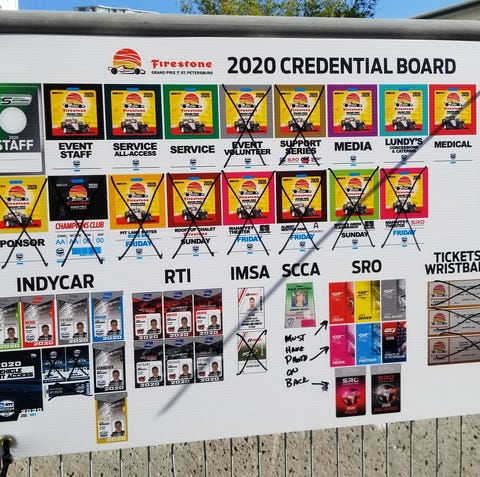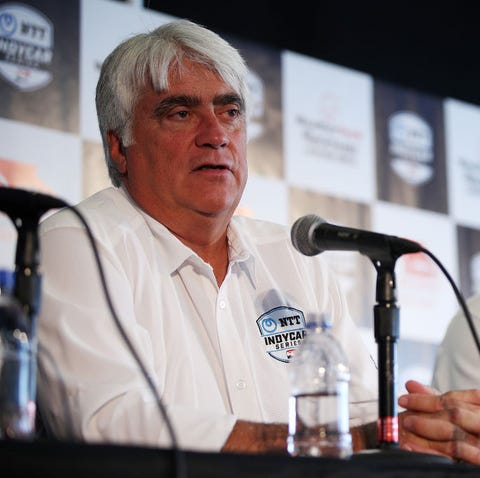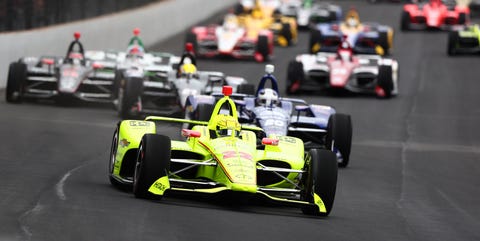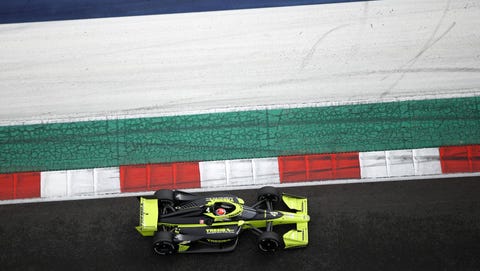Like everyone else in professional sports, all IndyCar officials can do right now is wait for the figurative coronavirus storm to pass and make the best decisions with the time and resources available.
The national state of emergency declared by United States president Donald Trump on Friday afternoon proved to be the final development that forced the cancellation of the season opening Grand Prix of St. Petersburg in Central Florida.
IndyCar was the last major North American motorsport to postpone its season, even after having USF2000 cars on track that morning, albeit behind closed grandstands. Like other sports, IndyCar had attempted to move forward with contesting a race without fans in attendance but was left with no other choice but to shut down.
In a Friday media teleconference, IndyCar CEO Mark Miles said the risk to any gathering of people had become too great.
“We learned that Disney was shutting down, we saw The Players Championship and Ponte Vedra go from their announcement they were going to play a major tournament for them without a crowd to canceling,” Miles said. “Really, there isn’t a sporting event left that feels comfortable running even without fans. I just think that’s reflective of what’s going on in the country and in the world.
“In this country, as you know, very few universities are unaffected. Schools at other levels are closing and asking families to stay home. Businesses are banning travel and asking their employees in many cases to work from home. Really I think it’s just the reality that our society right now is discouraging getting people together.”
Miles wouldn’t provide the exact number of people that were permitted into the facility on Friday but called it “way low.”
To his point, only essential personnel and select media were allowed into the track, numerous annual credential holders told in advance that they would not be permitted entry.
In addition to canceling St. Petersburg, IndyCar moved forward by announcing the postponements of all racing activity through the month of April. That means races at Barber Motorsports Park in Alabama and the Circuit of the Americas in Texas have also been postponed.
The Grand Prix of Long Beach in California was previously postponed when city officials nixed all events with large public gatherings through April, Miles saying he doesn’t see an opportunity to reschedule.
There are also concerns for what this means for smaller teams, that barely break even or turn a minimal profit just to continue racing throughout the season. Will the season be extended into the autumn and early winter months? Is the month of May and the Indianapolis 500 at risk of a similar postponement or cancellation?
Those are questions Miles can’t yet answer but is starting to form contingency plans around. He hopes to contest as much of the 17-race schedule as possible once it is safe to do so.
“I would just say we are absolutely focused on May,” Miles said. “We’re still in St. Petersburg, Florida. I’m with (Indianapolis track president) Doug Boles. We’re all going to go home and keep doing what we do. We’re going to be absolutely ready. That’s with the normal schedule. We will obviously evaluate everything every day by the hour.
“We’ll make any changes we have to make. But our mindset and our efforts are completely dedicated to being ready to put on a great show throughout May.”
The most important takeaways form the Friday IndyCar press conference at St. Petersburg can be found below.
Is the Indianapolis 500 At Risk?
As it stands right now, the first IndyCar race of the season would be the IndyCar Grand Prix at the Indianapolis Motor Speedway road course.
The current cancellations run through the start of the month of May. But what if IndyCar has to cancel into the early summer months?
“These are questions that can’t be answered,” Miles said. “You have to know we’ll do everything possible to have the Indianapolis 500 and the Grand Prix before it in May. If somehow that ends up not being feasible, we’ll be looking at all the other possibilities. Nobody knows of that… Just too many variables to anticipate at this point.”
Doubleheaders For Remaining Tracks?
It is all but certain that the Grand Prix of St. Petersburg and Grand Prix of Long Beach will not take place in 2020. For IndyCar to reach 17 races, it may decide to contest doubleheaders at some of the remaining venues this season.
There is already a scheduled doubleheader on the schedule, in June at the Belle Isle Raceway Park in Downtown Detroit. The event on the streets of Toronto contested doubleheaders in 2013 and 2014.
IndyCar may look to pull that lever later in the summer.
“I think that’s an idea that we’re aware of, something that we’ll take into account,” Miles said. “There’s all the considerations … taken into account, when we make the plan going forward. What can a broadcaster cover? What can the promoters do? What works for Honda and Chevy and our suppliers? We’ll do whatever is possible to do to create the fullest season.”
Concern for Smaller Teams?
Team owners Michael Shank (Michael Shank Racing) and Elton Julian (DragonSpeed) both own IMSA and IndyCar teams and have already publicly commented that the COVID-19 pandemic threatens to shutter their entire operations.
That’s not lost on Miles.
“I think we’re concerned about our whole ecosystem,” Miles said. “As I said just about an hour ago we had a call with all of our team owners. Everybody is taking stock in the situation. Everybody will sort and grind through it. I didn’t hear anybody thinking they weren’t going to be in business.
“We will be in very regular touch with them. I think if there’s anything about INDYCAR teams, it’s they’ve shown their resilience. They know how to manage. They care about their people. Right now, I think even more than thinking about their businesses, they’re thinking about their employees, keeping them safe, keeping them employed.
“We have real admiration for our team owners and I’m sure they’ll get through it.”
Organizational Quarantines?
“We were taking precautions as we opened the gates this morning, everybody that was coming into work answered questions about their recent travel and their recent health,” Miles said. “We were prepared with medical personnel to get them help if there was any indication that that was appropriate. That was here.
“Otherwise what we’re doing with teams, at this point I think most of society already has this, but we’re making sure they’re getting good information about the risks and good information about how to protect themselves and their employees.
“We’re not in a position to have to tell them what they’ve got to do. They’re smart people and they’ll figure it out in their own situations.”
Mandatory COVID-19 Tests for Returning Participants?
Mark Miles isn’t sure if it’s feasible or likely that IndyCar would require a negative coronavirus test as a condition for returning to work.
Like everything else right now, it’s just fluid.
“I don’t know the answer to that,” Miles said. “We’ll cross that bridge when we come to it quite frankly. That’s one of those things we’ll think through when we know when we can get everybody back together, based on what conditions are at the time.”
Source: Read Full Article




